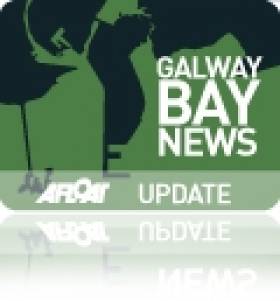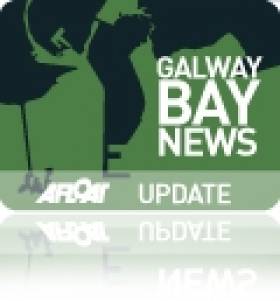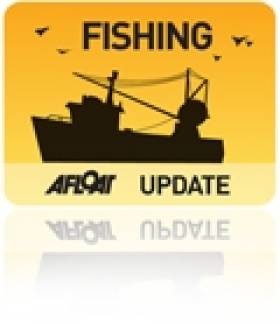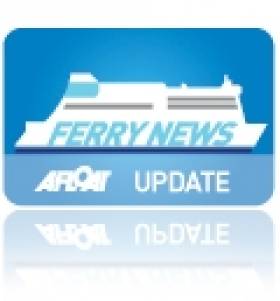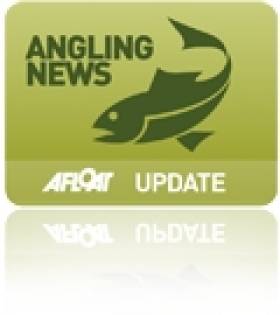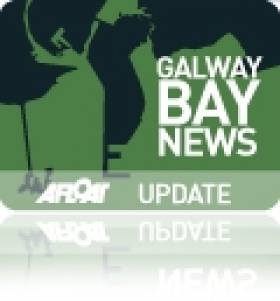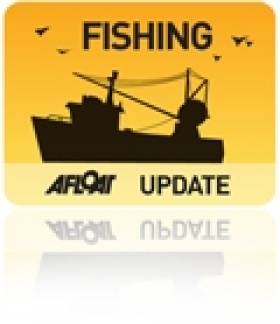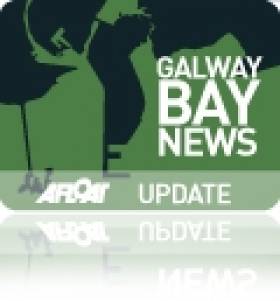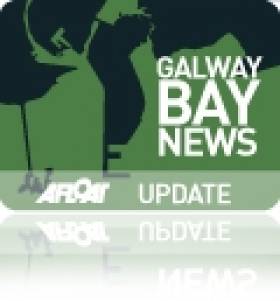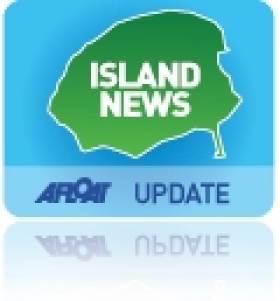Displaying items by tag: Aran Islands
Thousands Attend Fish Farm Protest in Galway
#FishFarm - As many as 2,000 people attended the protest in Galway against the proposed deep sea fish farm off the Aran Islands at the weekend.
As previously reported on Afloat.ie, the demonstration was organised by Galway Bay Against Salmon Cages on Saturday 2 March in opposition to the 500-hectare organic salmon farm proposed by Bord Iascaigh Mhara (BIM).
Among the speakers on the day, as The Irish Times reports, was Icelandic salmon conservationist Orri Vigfusson, who claimed the fish farm could interfere with the migration of salmon smolts from both Ireland and the rest of Europe.
GBASC vice-chairman Tommy Casserly also spoke, referring to the fish farm project as "a toxic cloud containing seven million caged salmon with all those faeces and chemicals and lice, between the Atlantic and 15,000 wild salmon which come through these waters".
Later in the day a delegation attempted to hand a letter of protest to BIM staff attending the Skipper Expo in the city, but said it was refused.
If the Galway Bay fish farm project gets the go-ahead, it would be the largest aquaculture facility of its type in Europe and would double the State's production rate of organic salmon.
The Irish Times has more on the story HERE.
Protest in Galway Over Fish Farm Plans This Weekend
#Fishfarm - Galway Bay FM reports that a major protest is set to take place in Galway this weekend against the proposed deep sea fish farm off the Aran Islands.
Galway Bay Against Salmon Cages is organising the demonstration from Eyre Square on Saturday 2 March at noon in opposition to the 500-hectare organic salmon farm proposed by Bord Iascaigh Mhara (BIM).
The facility, to be located off Inis Oírr in Galway Bay, would be the largest of its kind in Europe and would double the State's production rate of organic salmon, cited by BIM as Ireland's leading organic food export.
However, the scheme has been facing strong opposition from fisheries groups and local anglers citing the potential environmental impact on wild salmon numbers and the threat to tourism in the area.
Inland Fisheries Ireland is among those bodies that have expressed concern over the fish farm plans, citing research on the effect of sea lice emanating from aquaculture facilities on the mortality rate of wild Atlantic salmon.
BIM responded to news of the protest by stating such action may be unnecessary due to the appeal mechanism available in the State's decision process.
Morning Ireland Reports On Galway Bay Fish Farm Debate
#FishFarm - RTÉ Radio 1's Morning Ireland reports on last night's public meeting in Galway on the proposed deep sea fish farm in Galway Bay.
As previously reported on Afloat.ie, the 500-hectare organic salmon farm proposed by Bord Iascaigh Mhara (BIM) would be located off Inis Oírr in the Aran Islands, and would be the largest of its kind in Europe, set to double the State's production rate of organic salmon.
BIM's aquaculture development manager Donal McGuire moved to reassure concerned locals that the agency was "not about to damage [its] reputation" by "doing something foolish or doing something that will cause serious environmental damage".
McGuire added that organic salmon is Ireland's leading organic food export but is in "very very short supply", and that business would be lost to producers in Scotland and Norway.
However, the scheme has faced strong opposition from fisheries groups and local anglers citing the potential environmental impact on wild salmon numbers and the threat to tourism in the area.
At last night's meeting, RTE's western correspondent Pat McGrath says just two of the more than 100 in attendance spoke in support of the fish farm plans.
Another public meeting on the proposals is scheduled for tonight in Rossaveal.
BIM is expected to hold a public tender process for the proposed salmon farm project pending approval by Marine Minister Simon Coveney.
Steep Rise Set for Aran Islands Ferry Fares
#Ferries - Ferry fares for people travelling between Inis Mór in the Aran Islands and the mainland are set to almost double from tomorrow 1 February, as RTÉ News reports.
Island Ferries founder Paddy O'Brien has cited increased fuel costs for the sharp fare rise from €8 to €15 for return trips from the largest island in the group in Galway Bay.
Fares for residents of Inis Oírr and Inis Meáin are also rising by 25% after an increase in the annual subvention to provide ferry services to the islands sought by Island Ferries was not accepted by the Department of Arts, Heritage and the Gaeltacht.
The department had failed to secure any tenders for a public service contract on the Aran Islands ferry service, the present contracts for which expire today.
IFI Repeats Concerns Over Aran Islands Fish Farm
#Angling - Anglers on the River Feale in Kerry and Limerick have been assured by Inland Fisheries Ireland (IFI) that it supports their concerns over the proposed deep-sea fish farm in Galway Bay, as the Limerick Leader reports.
Local anglers are among those throughout the region who have rallied in opposition to plans for the Aran Islands fish farm project, over fears that it would lead to “an explosion” in parasitic sea lice which would prey on wild inland salmon from Irish rivers feeding in the North Atlantic.
IFI reiterated its statement issued last month in which its board said it does not believe "that the corpus of peer reviewed international scientific literature which recognises the negative impacts of sea lice on salmonids have been adequately dealt with" in the Environmental Impact Statement prepared by Bord Iascaigh Mhara (BIM) as part of the public consultation process.
A spokesperson for IFI told the Limerick Leader that the authority has "major concerns about the location and scale [of the farm], as well as its potential impact on sea life. [IFI] is not supporting it in its current form.”
Earlier this month the National Inland Fisheries Forum also criticised as "flawed" the consent process regarding the 15,000-tonne organic salmon farm planned off Inis Oirr, which would be the largest of its kind in Europe.
If approved, the operation could more than double Ireland's current production rate of farmed salmon.
The Limerick Leader has much more on the story HERE.
Fisheries Forum Lambasts Minister Over Galway Bay Fish Farm Decision Process
#FishFarm - The National Inland Fisheries Forum (NIFF) has criticised as "flawed" the consent process regarding the proposed deep-sea fish farm in Galway Bay which has stirred much controversy in recent weeks.
In a letter to the Department of Agriculture, Food and the Marine as part of the public consultation process, NIFF chair Derek Davis writes that the forum "considers the consent process to be flawed" as a result of "the decision making function being exercised by the Minister for Agriculture, Fisheries and Food" in a number of circumstances, including where:
- the applicant - Bord Iascaigh Mhara (BIM) - "has several appointees of the said minister at board level";
- the State fisheries board "receives funding and policy directions from the minister's department";
- public announcements made on the proposals and related concerns "indicate pre-judging of the issues";
- any appeal following the minister's decision "would be dealt with by appointees of the minister"; and where
- the "specific statutory basis" on which BIM authorises aquaculture operations "has not been adequately set out".
The letter reiterates Inland Fisheries Ireland's (IFI) criticisms of the Environmental Impact Statement (EIS) carried out on the proposed location of the 15,000-tonne organic salmon farm off the Aran Islands, stating the NIFF's believe that the document "is deficient in a number of areas" such as not adequately addressing wild salmon migration routes, and making presumptions on the potential impact of sea lice and escaped farmed salmon on adjacent fisheries.
The forum also has concerns regarding the public consultation itself, noting that requests for "specific scientific information used to underpin statements in the EIS" have not been followed through.
"The forum believes that on the basis of the information supplied, the minister is not in a position to make a positive decision on this application," writes Davis. "To do so would represent a failure to adhere to the precautionary principle" which applies "where there is uncertainty as to the existence or extent of risks".
The letter in full is available as a PDF to download HERE.
BIM to Hold Public Tender for Galway Bay Fish Farm
#FISHFARM - Bord Iascaigh Mhara (BIM) is set to hold a public tender process for the development of the proposed deep sea fish farm in Galway Bay, according to The Irish Times.
Financiers around the world have expressed interest in the 500-hectare organic salmon farm to be located off Inis Oirr in the Aran Islands, though BIM said it was not at liberty to disclose who they are.
As previously reported on Afloat.ie, the proposed fish farm would be the largest of its kind in Europe, set to double the State's production of organic salmon.
BIM says it is already receiving inquiries for jobs from emigrants wishing to return home.
However the scheme has faced opposition from Inland Fisheries Ireland (IFI) and local anglers, who cite the potential threat to wild salmon numbers in the area.
IFI recently issued a statement regarding its submission on the project's Environmental Impact Statement, raising concerns about the scale of the development and the impact of sea lice - infestations of which are often concentrated by aquaculture.
The public consultation that began in mid-October is scheduled to conclude next Wednesday 12 December.
Angling Writer 'Deeply Concerned' Over Aran Islands Fish Farm Plans
#GALWAY FISH FARM - In his latest angling column for The Irish Times, Derek Evans writes of his 'deep concern' over the proposed deep sea salmon farm off the Aran Islands in Galway Bay.
Making reference to new research that shows infestations of sea lice - which often concentrate in fish farms - pose a significant threat to the survival of wild salmon fisheries, as previously reported on Afloat.ie, Evans writes that the "untold damage" from such infestations would be "nothing short of catastrophic".
He adds: "While this latest proposal is a step in the right direction in terms of its 'off-shore' location, nevertheless, it will bring a plethora of problems, beginning with the size of its annual output and the 'baggage' that entails if and when it moves into unchartered waters."
Evans also points to the submission on the Environmental Impact Statement (EIS) made by Inland Fisheries Ireland (IFI), which includes "an additional checklist for consideration including the location and dimension of this proposed farm; site characteristics; production process; potential impacts; monitoring; and organic farming", as well as suggesting an assessment of all wild salmon fisheries in the affected area, plus a full monitoring system and baseline study.
Evan's comments come in the wake of IFI's dispute with Bord Iascaigh Mhara over the exclusion from the statutory consultation of a report critical of the proposed salmon farm off Inis Óirr, which has faced opposition from local salmon anglers.
The Irish Times has much more on the story HERE.
IFI Board Issues Statement on Galway Bay Fish Farm
#GALWAY FISH FARM - The board of Inland Fisheries Ireland (IFI) has issued a statement on the proposed Aran Islands deep sea salmon farm in Galway Bay, which has been the source of some controversy in recent weeks.
The board said it agrees with the recent statement by Minister Fergus O’Dowd on offshore salmon farming, and that it welcomes the development of Ireland’s aquaculture sector "once any development complies with Ireland’s obligations under relevant EU environmental legislation, particularly the Habitats Directive, and does not adversely affect salmon and sea trout stocks."
In addition, the IFI board said it has made a submission on the Environmental Impact Statement (EIS) prepared by Bord Iascaigh Mhara (BIM) for the proposed offshore salmon farm as part of the public consultation process, which is available on the IFI website.
As previously reported on Afloat.ie, the public consultation period began last month for the 500-hectare organic fish farm to be located off Inis Oirr. BIM has applied for a deep sea salmon farming licence at the site, which would be one of the largest of its kind in Europe. If approved, the operation could more than double Ireland's current farmed salmon production rate.
The IFI board's statement notes: "In the submission, concerns were raised in relation to the location and scale of the proposed salmon farm and how its development and operation could impact on wild salmon and sea trout stocks and their habitat.
"These concerns are based on scientific reports by respected authors and knowledge of the impact of existing fish farms on salmon and sea trout populations off the west coast of Ireland."
The submission also highlights "recent peer reviewed international scientific literature on the impacts of sea lice on salmonids" which poses a significant threat to wild salmon in Irish waters, as reported on Afloat.ie.
The board said it does not believe "that the corpus of peer reviewed international scientific literature which recognises the negative impacts of sea lice on salmonids have been adequately dealt with in the EIS".
While welcoming "any sustainable initiative which will provide jobs in rural coastal communities", the IFI board said it questions the figure of 500 jobs it's been reported the 15,000-tonne fish farm project would create, making comparison to a new 2,000-tonne aquaculture scheme in Scotland that's expected to create just four full-time positions.
The board members say they "have serious concerns that whatever the number of jobs created by the current proposal, they will be more than offset by the associated loss of jobs in the recreational angling and tourism sectors" if the scheme results in any negative effects on those areas.
"Ireland's reputation as a pristine wild fishery destination must be safeguarded," they added, noting that proposals for two further offshore salmon farms in Mayo and Donegal "are premature given that significant issues over the current proposal have not yet been resolved.
"No further applications should be progressed until all stakeholders are satisfied that the current proposal is sustainable and has no adverse impact on wild salmon and sea trout stocks."
Inland Fisheries Ireland is the State agency charged with the conservation, protection, development management and promotion of Ireland's inland fisheries and sea angling resource.
Engineering Prize for Aran Islands Harbour
#ISLAND NEWS - Cill Rónáin Harbour in the Aran Islands has been voted by the public as Best Engineering Project of the Year for 2012.
Silicon Republic reports on the announcement, made at the third Engineers Ireland Excellence Awards last Friday.
The harbour on Inis Mór is twice the size of Croke Park and was constructed from more than 77,000 of stone blocks from Connemara, a choice aimed at protecting the breakwater from erosion by the sea.
Its modern design is also the result of scale model testing by a UK-based hydro lab, while during construction the process was overseen by a marine mammal observer to ensure the disturbance to local marine wildlife was minimal.
The harbour was shortlisted along with other waterfront projects such as the Clonmel Food Relief Scheme, the Giant's Causeway Visitor Centre, the Michael O'Shaughnessy Bridge over the Eglinton Canal in Galway City, the north Co Dublin Waste Water Treatment Scheme and Titanic Belfast.
Silicon Republic has much more on the story HERE.


























